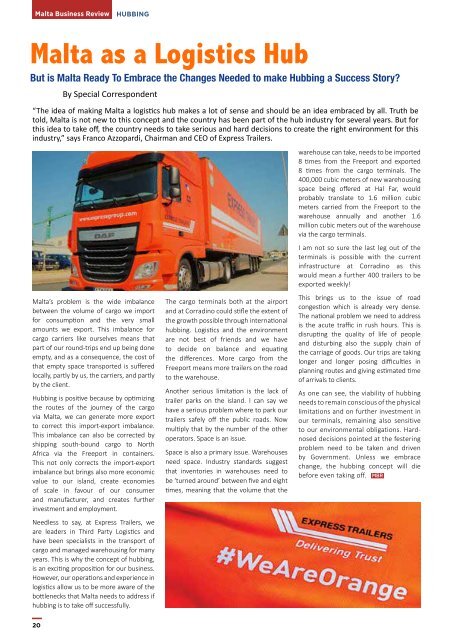Create successful ePaper yourself
Turn your PDF publications into a flip-book with our unique Google optimized e-Paper software.
Malta Business Review<br />
hubbing<br />
Malta as a Logistics Hub<br />
But is Malta Ready To Embrace the Changes Needed to make Hubbing a Success Story?<br />
By Special Cor<strong>res</strong>pondent<br />
“The idea of making Malta a logistics hub makes a lot of sense and should be an idea embraced by <strong>all</strong>. Truth be<br />
told, Malta is not new to this concept and the country has been part of the hub industry for several years. But for<br />
this idea to take off, the country needs to take serious and hard decisions to create the right environment for this<br />
industry,” says Franco Azzopardi, Chairman and CEO of Exp<strong>res</strong>s Trailers.<br />
warehouse can take, needs to be imported<br />
8 times from the Freeport and exported<br />
8 times from the cargo terminals. The<br />
400,000 cubic meters of new warehousing<br />
space being offered at Hal Far, would<br />
probably translate to 1.6 million cubic<br />
meters carried from the Freeport to the<br />
warehouse annu<strong>all</strong>y and another 1.6<br />
million cubic meters out of the warehouse<br />
via the cargo terminals.<br />
I am not so sure the last leg out of the<br />
terminals is possible with the current<br />
infrastructure at Corradino as this<br />
would mean a further 400 trailers to be<br />
exported weekly!<br />
Malta’s problem is the wide imbalance<br />
between the volume of cargo we import<br />
for consumption and the very sm<strong>all</strong><br />
amounts we export. This imbalance for<br />
cargo carriers like ourselves means that<br />
part of our round-trips end up being done<br />
empty, and as a consequence, the cost of<br />
that empty space transported is suffered<br />
loc<strong>all</strong>y, partly by us, the carriers, and partly<br />
by the client.<br />
Hubbing is positive because by optimizing<br />
the routes of the journey of the cargo<br />
via Malta, we can generate more export<br />
to correct this import-export imbalance.<br />
This imbalance can also be corrected by<br />
shipping south-bound cargo to North<br />
Africa via the Freeport in containers.<br />
This not only corrects the import-export<br />
imbalance but brings also more economic<br />
value to our island, create economies<br />
of scale in favour of our consumer<br />
and manufacturer, and creates further<br />
investment and employment.<br />
Needless to say, at Exp<strong>res</strong>s Trailers, we<br />
are leaders in Third Party Logistics and<br />
have been specialists in the transport of<br />
cargo and managed warehousing for many<br />
years. This is why the concept of hubbing,<br />
is an exciting proposition for our business.<br />
However, our operations and experience in<br />
logistics al<strong>low</strong> us to be more aware of the<br />
bottlenecks that Malta needs to add<strong>res</strong>s if<br />
hubbing is to take off successfully.<br />
The cargo terminals both at the airport<br />
and at Corradino could stifle the extent of<br />
the growth possible through international<br />
hubbing. Logistics and the environment<br />
are not best of friends and we have<br />
to decide on balance and equating<br />
the differences. More cargo from the<br />
Freeport means more trailers on the road<br />
to the warehouse.<br />
Another serious limitation is the lack of<br />
trailer parks on the island. I can say we<br />
have a serious problem where to park our<br />
trailers safely off the public roads. Now<br />
multiply that by the number of the other<br />
operators. Space is an issue.<br />
Space is also a primary issue. Warehouses<br />
need space. Industry standards suggest<br />
that inventories in warehouses need to<br />
be ‘turned around’ between five and eight<br />
times, meaning that the volume that the<br />
This brings us to the issue of road<br />
congestion which is already very dense.<br />
The national problem we need to add<strong>res</strong>s<br />
is the acute traffic in rush hours. This is<br />
disrupting the quality of life of people<br />
and disturbing also the supply chain of<br />
the carriage of goods. Our trips are taking<br />
longer and longer posing difficulties in<br />
planning routes and giving estimated time<br />
of arrivals to clients.<br />
As one can see, the viability of hubbing<br />
needs to remain conscious of the physical<br />
limitations and on further investment in<br />
our terminals, remaining also sensitive<br />
to our environmental obligations. Hardnosed<br />
decisions pointed at the festering<br />
problem need to be taken and driven<br />
by Government. Unless we embrace<br />
change, the hubbing concept will die<br />
before even taking off. <strong>MBR</strong><br />
20

















